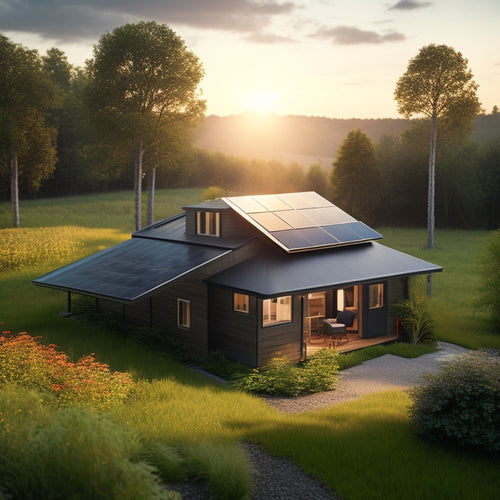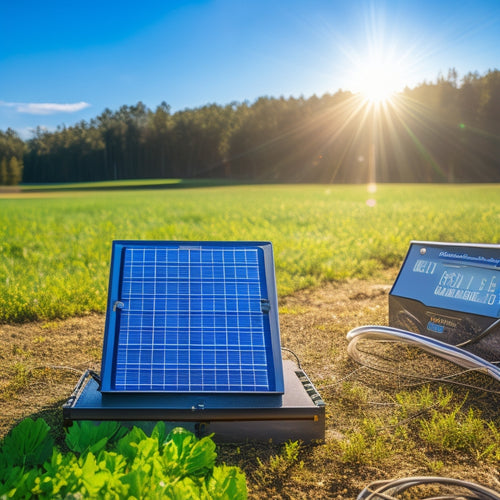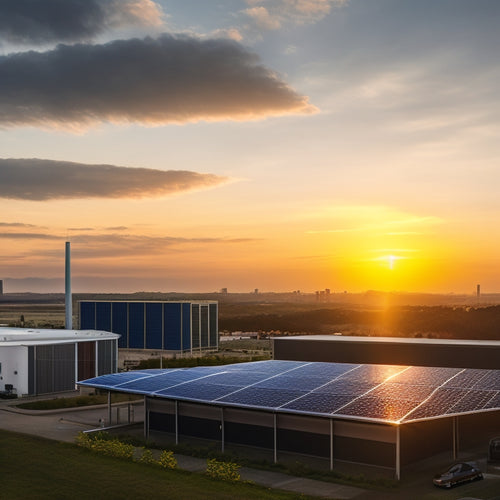
Solar Best
Share
You're investing in the best possible solar energy system, one that maximizes your energy independence, reduces your carbon footprint, and provides a strong return on investment. By utilizing solar power, you'll reduce your reliance on finite fossil fuels, decreasing greenhouse gas emissions and energy costs. High-efficiency solar panel cells, with efficiencies up to 26.7%, will optimize your energy output. Guarantee a successful installation by evaluating your roof size, material, and obstruction considerations. With modern solar panels designed for durability, you can expect an extended lifespan of 25 years or more. Now, investigate the complexities of solar energy to access its full potential for your specific needs.
The Essentials
- High-efficiency solar panels maximize energy output, exceeding 22% cell efficiency ratings and enhancing electricity generation.
- Government incentives, such as tax credits and rebates, offset installation costs, making solar energy more accessible.
- Solar power generates electricity without greenhouse gas emissions, contributing to reduced air pollution and climate change mitigation.
- A suitable roof size and material, free from obstructions, ensures adequate energy generation and optimal solar panel installation.
- Regular maintenance, including cleaning, reduces energy loss and enhances performance, leading to an extended lifespan of solar panels.
Harness Renewable Energy Source
You're about to investigate the benefits of utilizing renewable energy sources, which offer a cleaner alternative to fossil fuels and mitigate climate change.
By shifting to renewable energy, you'll reduce greenhouse gas emissions and create a healthier environment.
With the help of off-grid solar power systems, you can break free from traditional grid-based energy and enjoy energy independence.
This change will also allow you to diversify your energy sources, decreasing dependence on finite resources and promoting energy security.
Renewable Energy Benefits
By embracing solar energy, individuals and organizations can tap into a plethora of benefits that come with utilizing a renewable energy source.
You'll reduce your reliance on finite fossil fuels, decreasing your carbon footprint and contributing to a cleaner environment. Additionally, solar panels can help address the issue of rising energy costs by providing an alternative, renewable source of power, thereby diminishing reliance on expensive grid electricity Energy Efficiency.
In addition, solar panels cater to individuals looking to increase their energy independence and reliance, providing power even during grid outages, thereby ensuring an uninterrupted supply of electricity.
Government incentives, such as tax credits and rebates, can greatly offset the initial investment costs of installing solar panels. You may also have the opportunity to participate in community solar programs, which allow multiple individuals or organizations to share the benefits of a single solar array. This approach can be particularly advantageous for those who can't install solar panels on their own property.
Furthermore, solar energy can provide a sense of energy independence, as you'll be generating your own electricity and reducing your dependence on the grid.
With the cost of solar panels decreasing over the years, the benefits of solar energy have never been more accessible. By utilizing the power of the sun, you'll be taking an essential step towards a more sustainable future.
Energy Source Diversification
Diversifying your energy sources with solar power adds another dimension to your renewable energy strategy, allowing you to immerse yourself in a cleaner and more sustainable way of generating electricity.
By incorporating solar energy into your mix, you'll reduce your reliance on fossil fuels and lower your carbon footprint. This, in turn, will help you capitalize on solar incentives and energy policies that support a greener energy environment.
With the ability to provide a self-sufficient source of energy, minimizing reliance on the grid, and enabling you to enjoy uninterrupted power supply wherever you're Off Grid Solar, solar power integration also allows you to tap into a decentralized energy system, giving you more control over your energy generation and distribution.
This shift towards energy independence is particularly appealing to those who value freedom and self-sufficiency.
Additionally, solar energy can be scaled up or down depending on your energy needs, making it an adaptable and efficient choice for both residential and commercial applications.
As you investigate energy source diversification, it's crucial to stay informed about changing energy policies and incentives that can help offset the initial investment costs of solar infrastructure.
Reduces Carbon Footprint Significantly
You're switching to solar energy, a green energy source that reduces your reliance on fossil fuels.
By utilizing photovoltaic systems, you'll not only reduce your carbon footprint but also contribute to a sustainable living environment.
By doing so, you'll lower emissions today, contributing less to climate change and air pollution.
With solar power, you'll greatly shrink your carbon footprint, making a positive impact on the environment.
Green Energy Source
As the world shifts towards a more sustainable future, solar energy has emerged as a frontrunner in reducing our reliance on fossil fuels and mitigating climate change.
You're probably aware that solar energy is a green energy source, but what makes it so effective? For starters, solar energy is a renewable resource, meaning it's sustainable and won't run out anytime soon.
This sets it apart from fossil fuels, which are finite and contribute greatly to climate change. As you investigate solar energy, you'll find that it offers a cleaner, more environmentally friendly alternative.
Governments and organizations have taken notice, implementing solar incentives and energy policies to encourage its adoption. These initiatives have made solar energy more accessible and affordable, laying the groundwork for a cleaner, greener future.
Lower Emissions Today
Sustainability demands a drastic reduction in greenhouse gas emissions, and solar energy is at the forefront of this effort. You're likely aware that the burning of fossil fuels is a significant contributor to climate change, and it's crucial to switch to cleaner alternatives.
By adopting solar energy, you're taking a substantial step towards reducing your carbon footprint. Solar power generates electricity without emitting any greenhouse gases, making it an attractive option for those committed to sustainable practices.
You'll be reducing your reliance on fossil fuels, which is a significant contributor to pollution. As you shift to solar energy, you'll notice a drastic decrease in your emission output.
This reduction in emissions will have a direct impact on the environment, helping to preserve natural resources for future generations. By choosing solar energy, you're investing in a cleaner, healthier planet.
With solar power, you're not only reducing your carbon footprint but also promoting a sustainable future.
High-Efficiency Solar Panel Cells
You're likely familiar with the importance of maximizing energy output in solar panels. High-efficiency solar panel cells play a vital role in achieving this goal, and it's important to understand their cell efficiency ratings.
With top-rated high-efficiency residential solar panels, homeowners can enhance their home's energy and reduce their electric bill. By opting for high-efficiency cells, you can considerably increase your energy output, translating to more power and a faster return on investment.
Cell Efficiency Ratings
Most high-efficiency solar panels boast cell efficiency ratings exceeding 22%. You're likely wondering what this means and how it affects your solar panel's performance. Essentially, cell efficiency ratings measure how well a solar panel converts sunlight into electricity. The higher the rating, the more efficient the panel.
Recent solar technology advancements have led to significant improvements in cell performance. For instance, top-tier manufacturers now produce cells with efficiencies ranging from 23% to 26.7%. This means they can generate more power per unit area than their lower-efficiency counterparts.
When comparing cell performance, you'll notice that high-efficiency panels often have higher power outputs, lower temperature coefficients, and improved low-light performance.
As you evaluate high-efficiency solar panels, pay attention to the cell efficiency rating. While higher ratings often come with higher price tags, they can provide more energy independence and faster returns on your investment.
Energy Output Boost
As high-efficiency solar panel cells convert more sunlight into electricity, they inherently provide an energy output increase. You benefit from this enhancement when you integrate high-efficiency cells into your solar panel system.
With more energy generated, you'll have a greater surplus to store in your energy storage systems or feed back into the grid. This surplus can be especially significant during periods of low energy demand, allowing you to make the most of your investment.
High-efficiency cells enable you to maximize your energy output, even in areas with limited roof space or partial shading. You'll enjoy a faster return on investment as you generate more electricity per unit area.
Additionally, high-efficiency cells facilitate seamless grid integration, ensuring a stable and efficient supply of clean energy to your home or business. By choosing high-efficiency solar panel cells, you're taking an essential step towards energy independence and reducing your reliance on the grid.
Check Your Roof Size
You'll need to assess your roof's dimensions to determine the maximum number of solar panels it can accommodate, as this directly impacts the system's overall energy output.
When selecting a photovoltaic system, consider the space required for mounting systems and rechargeable batteries.
Inspect your roof for obstructions like skylights, vents, and chimneys that could reduce the available space for panel installation.
Roof Dimension Importance
With solar panels becoming an increasingly popular choice for homeowners, understanding the importance of roof dimension is crucial for a successful installation. You need to verify your roof is suitable for solar panels, and that starts with evaluating its size and dimensions. A roof that's too small may not be able to accommodate enough panels to generate sufficient energy, while a roof that's too large may lead to unnecessary costs.
When examining your roof's dimension, consider the type of roof materials you have. Different materials, such as asphalt shingles or metal roofing, have varying weights and structural requirements that can impact the installation process.
Additionally, installation challenges such as obstructions, skylights, and vents must be taken into account. By understanding your roof's dimension and material, you can determine the ideal solar panel configuration and avoid potential installation issues.
This will help you maximize your energy output while minimizing costs and guaranteeing a smooth installation process.
Roof Obstruction Inspection
Most homeowners have at least one obstruction on their roof that can impact solar panel installation. As you consider going solar, it's important to inspect your roof for any obstructions that could affect the performance of your solar panels.
A thorough roof obstruction inspection involves evaluating your roof's condition, including its size, shape, and material. You'll need to identify any vents, skylights, chimneys, or other features that could cast shadows or obstruct sunlight.
A shading analysis is also vital to determine the amount of shade your roof receives throughout the day. This will help you identify the best locations for your solar panels and optimize their energy output.
Be sure to inspect your roof for any signs of wear and tear, such as curled or missing shingles, rusty flashing, or sagging gutters. Addressing these issues before installation can save you time and money in the long run.
Longer Lifespan Guaranteed
You expect your solar panels to last for a long time, and rightly so.
With a well-maintained system, you can extend their lifespan beyond the industry's average expectancy.
Last Longer Than Expected
How can solar panels, once considered a fleeting investment, now outlast their predicted lifespan by a significant margin? The answer lies in advancements in solar panel durability and effective maintenance practices. Modern solar panels are built to withstand harsh environmental conditions, and manufacturers are now providing longer warranties, often up to 30 years or more.
| Factor | Impact on Lifespan |
|---|---|
| High-quality materials | Increased resistance to degradation |
| Regular cleaning | Reduced energy loss due to dirt and debris |
| Sturdy frame design | Improved structural integrity |
| Advanced manufacturing techniques | Enhanced panel efficiency and lifespan |
You can now expect your solar panels to last longer than expected, often exceeding their predicted lifespan by 5-10 years or more. This increased durability not only saves you money on replacement costs but also provides a greater return on your investment. With proper maintenance and installation, you can enjoy the benefits of solar energy for decades to come, securing your freedom from reliance on traditional energy sources.
Frequently Asked Questions
Can I Install Solar Panels on a Rental Property?
You can install solar panels on a rental property if you obtain tenant permission, but consider a solar lease to mitigate potential disputes; guarantee you understand local regulations and property owner agreements before proceeding.
Do Solar Panels Work During Power Outages?
Can you truly rely on solar panels during power outages? Unfortunately, no, unless you have solar energy storage. With a battery backup, you'll achieve grid independence, ensuring you stay powered up when the grid goes down.
Are Solar Panels Resistant to Hail and Extreme Weather?
You'll find that most solar panels are designed to withstand hail damage and extreme weather conditions, ensuring weather durability; they're typically built with tempered glass or durable plastics, allowing them to resist impacts and harsh environmental factors.
Can I Add More Panels to My Existing System?
You can easily expand your existing system, but first, you'll need to assess your system's capacity to handle additional panels, considering factors like installation costs and potential upgrades to guarantee a seamless integration.
Do Solar Panels Require Regular Maintenance?
You'll be relieved to know that solar panels require minimal maintenance, ensuring their longevity. Regular cleaning and inspections can help prevent issues, but maintenance costs are relatively low, giving you peace of mind and freedom from hassle.
Final Thoughts
As you commence on the solar expedition, imagine utilizing the limitless power of the sun to fuel your daily life. With high-efficiency solar panels, you'll notably shrink your carbon footprint, leaving a lighter tread on the planet. Your roof becomes a canvas, painting an image of sustainability. And with a longer lifespan guaranteed, your investment shines bright, a guiding light of innovation, illuminating a cleaner, greener future.
Related Posts
-

Diy Off Grid Solar
By embracing DIY off-grid solar, you can break free from grid dependence, slashing your energy bills by up to 90% and...
-

Choosing the Right Solar Power Charge Controller
Choosing the right solar power charge controller is crucial for maximizing energy efficiency and extending battery li...
-

Advantages of Commercial Solar Battery On-Site Storage
By investing in a commercial solar battery on-site storage system, you can greatly reduce your energy grid dependence...


